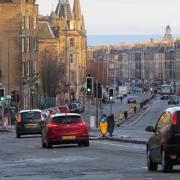
Another flurry of correspondence bears witness to discontent and disagreement over the Leith Walk improvements.
Councillor Munro (Ward 13) wrote yesterday in a widely circulated email addressed to 'Mansour et al.' (meaning Mansour Marouf – a Leith Walk businessman – and like-minded supporters of the petition against loss of parking, and other interested parties).
Marouf had earlier rejected Munro's explanation of new parking arrangements and defence of the consultation process which led up to them, claiming that City of Edinburgh Council had consulted in bad faith and 'NEVER takes the needs of the businesses and residents into consideration'.
This time, Councillor Munro replied by saying that his first email had been 'misunderstood', and that he had provided links to factual information which countered the terms of the petition. Those original terms, he noted, 'were changed following my e-mail'.
Councillor Munro then went on to say that the amount to be spent on Leith Walk had been substantially increased recently: 'In my view, this funding will enhance Leith Walk for all but clearly this is not a view you hold and we will have to disagree.'
If anyone thought this slightly terse exchange would put an end to the matter, they were mistaken.
Keith Hales of the Leith Business Association weighed in next, saying Munro had missed the point: ‘The agenda is not being driven by residents and businesses but by politicians and council officials. Much of which is dogma. Decisions have been made and enforced upon the consultation without, repeat, without any dialogue’. Hence the whole process is, he claimed, close to falling apart.
In a follow-up email, Hales continued: ‘It seems to many that all the time and effort has gone into satisfying the cycle lobby at the expense of the wider community.’
This is perhaps the logical inversion of Greener Leith’s recent suggestion that traders’ attachment to the present parking arrangement is based partially on narrow self-interest.
Meanwhile, Gordon [surname unknown] from the Bedshop wrote to Munro saying that the councillor could not be expected to understand as he had never run a business on Leith Walk. For the avoidance of doubt, he repeated in bold capital letters that:
'REDUCED PARKING WAS NEVER MENTIONED, NEVER DISCUSSED AND NEVER PROMISED. COMPLETE RE-INSTATEMENT WAS DISCUSSED AND IT WAS PROMISED.'
Local businesswoman and resident Tracy Griffen re-entered the debate next. She has a foot on both sides of the argument, and wrote to Councillor Munro and others on the email list to stress that time is of the essence:
‘A re-installed Leith Walk, which is pedestrian and cycle friendly, will help revive the area and must be acted upon as soon as possible. Small businesses depend on it. Tighter parking regulations and enforcement is an obvious way to help accommodate car parking availability.'
Debate is generally a good thing, and with so many varied interests competing for priority on Leith Walk there was always going to be plenty of it (see Breaking news, 2.1.14 and follow the links). We will content ourselves at this stage by observing, as neutrally as possible, that:
- There is a worrying lack of confidence in some quarters about the framework in which City of Edinburgh Council has encouraged such discussion to take place. CEC needs to address this.
- Maligning the good intentions of officials and politicians is at best unhelpful, and at worst deeply unfair. It is certainly not a basis for improving dialogue.
- Consultees publicly turning their frustration on each other will help none of them. United they will stand, divided they risk falling into a pot hole.